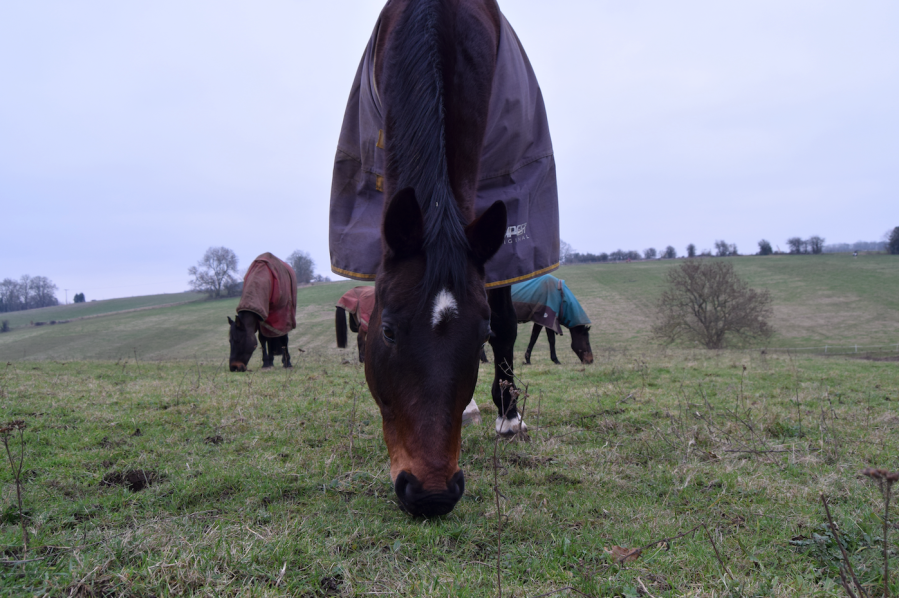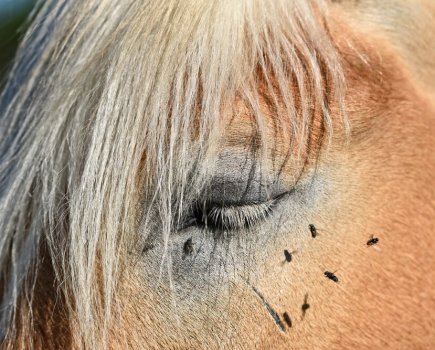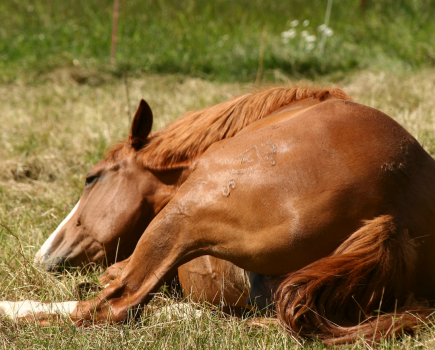In partnership with SPILLERS™, proud supporters of #FitNotFat
Some horses appear to gain weight simply by looking at grass and while this of course isn’t actually true, grazing is certainly one of the hardest elements of your horse’s diet to control. Swot up on our 11 great grass facts to help you to manage your horse’s turnout routine this season and keep their waistline in check…
1 A 250kg pony may consume 12.5kg of grass per day (dry matter!)
Studies have reported total dry matter (DM) intakes of 1.5-5.2% of bodyweight per day. Although individual requirements vary, a total daily forage intake of 1.5% bodyweight DM for weight loss and 2% bodyweight DM for maintenance is often used as a guide.
2 Horses may gain weight on winter grazing
Mature, brown grass may contain a similar level of calories to hay (or less!) but can still exceed requirements if there is enough of it available. On the other hand, it’s possible for well managed winter pasture to provide the same amount of calories as competition feed when the weather is mild.
3 Think WSC not just simple sugars
Grass contains simple sugars (most of which is sucrose, the main form of sugar in molasses) and fructan or ‘stored sugar’. Collectively, simple sugars and fructan are described as water soluble carbohydrates or ‘WSC’. Grass in the UK may contain up to 15% simple sugars and up to 35% WSC (dry matter). Despite the controversy it sometimes receives, there is insufficient evidence to rule fructan out as a risk factor for insulin dysregulation and laminitis.
4 Calorie overload can happen on grass
A 250kg pony living out 24/7 may consume enough energy (calories) to fuel a 500kg racehorse from grass alone every day…
5 Too much sugar can be consumed in grass
A 250kg pony living out 24/7 may consume almost 2kg of simple sugars and 4.5kg of WSC per day…
6 Sugar levels in grass can be hard to predict
The WSC or ‘sugar’ content in grass is highly variable and, in some cases, may fluctuate by the hour. Environmental factors such as the health of the soil, sunlight, rainfall and temperature may have greater effect on the sugar content than the stage of growth or grass species.
7 Weight gain can be rapid
In one study, ponies turned out for 23 hours every day for six weeks gained 16% of their bodyweight — that’s the equivalent of an 11 stone human gaining almost 2 stone in just six weeks!
8 Sunlight triggers sugar production
Grass will continue to photosynthesis and in turn, produce sugar, whenever the sun is shining. When the soil temperature is consistently above 5°C, fructan (stored sugar) will be used to fuel grass growth overnight, which means provided it’s warm enough, WSC or ‘sugar’ levels are likely to reduce overnight and be lowest at dawn.
9 Consider the frost factor
Frosty grass per se isn’t a problem but combine it with bright sunlight and high levels of WSC may start to accumulate. If it’s been too cold for the grass to grow overnight, WSC levels will not have reduced before sugar production begins again.
10 A grazing muzzle can reduce grass intake by 80%
Grazing muzzles have been shown to reduce grass intake by approximately 80% in ponies turned out for 3 hours, regardless of the season. Grazing muzzles can be used all year round provided the grass is not too short or too long to be accessed through the base of the muzzle!
11 Strip grazing has huge health benefits
In a recent study, strip-grazed ponies were found to gain significantly less weight than ponies with free access to restricted grazing over a 28-day period.
Worried about your horse or pony’s weight gain?
Unfortunately, you won’t be able to measure the calorie (or sugar) content of your grazing, or how much of it your horse is eating. The thing you have greatest influence over — and in some cases the only thing you can influence — is the amount of grass your horse has access to. There’s no magic bullet and the most effective method or combination of methods, as well as the degree of restriction needed, will vary depending on your individual horse/pony and your yard environment.
For friendly, advice on managing your horse’s grass intake why not try contacting the SPILLERS Care-Line on 01908 226626
![]() Have you heard about Your Horse’s #FitNotFat campaign? Equine obesity is an enormous welfare problem and we’re on a mission to provide owners and riders with the knowledge, skills and information you need to keep your horse in tip-top health. It could be life saving! Find out more
Have you heard about Your Horse’s #FitNotFat campaign? Equine obesity is an enormous welfare problem and we’re on a mission to provide owners and riders with the knowledge, skills and information you need to keep your horse in tip-top health. It could be life saving! Find out more
Related content








